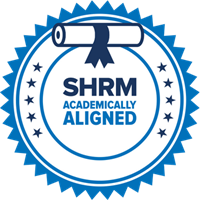Online Master of Arts in Human Resources
Are you interested in pursuing a degree in Human Resources? The Master of Arts in Human Resources (MAHR) accelerated, online program at Ottawa University prepares students to develop, support, and administrate personnel in business organizations across all industries. Graduates of our Human Resources masters program will understand the challenges of employment and staffing; the complexities of compensation and benefits; the policies and programs that promote employee responsibility, production and satisfaction; and the methods to hire, retain and terminate employees based on legal policies and ethical parameters that protect both the rights of workers and the interests of the company.
With OU’s online MAHR degree, you will be poised to lead HR teams in organizations of every industry reach their goals. Whether it’s in education, manufacturing, local government, private corporations or non-profits, every organization wants to attract the most qualified employees for their job opportunities. This graduate program is designed to help you increase your human resources skills and positively impact the lives of others.
HR Concentrations
Ottawa’s masters degree in human resources offers two concentrations that allow you to tailor your degree in an area of specialization, such as:
HR Curriculum
Ottawa’s accelerated, online masters in human resources degree is designed for busy working adults who are looking to advance their career. The program provides students with the skills and knowledge necessary to assume leadership roles in human resources and related professions as human resources managers, consultants, employee and student development counselors, or trainers. Courses may include:
- Managing Human Resources Costs
- Human Resource Planning and Administration
- Wage, Salary, and Benefit Administration recruitment.
- Recruitment, Selection, and Placement
- Training and Development
- Organizational Behavior and Theory
- Employment Law
- Value Systems and Professional Ethics
- Trends, Issues, and Perspectives in Human Resources
- Research: Assessment and Evaluation
- Applied Case Studies in Human Resources
For curriculum and course descriptions, please download a program overview.
Why Pursue a Masters in HR?
There are several HR career paths and advancement opportunities in just about every industry imaginable. Today, those holding a human resources graduate degree perform beyond the requisite administrative functions and consult with top executives regarding strategic planning. They have moved from being behind-the-scenes administrators to leadership roles whereby they are oftentimes involved in changing company policies.
SHRM Approved HR Degree
Ottawa University’s online Master of Arts in Human Resources degree prepares you to take the exam leading to designation as a Society for Human Resource Management (SHRM) Certified Professional (SHRM-CP) or SHRM Senior Certified Professional (SHRM-SCP), and the program is fully aligned with SHRM’s HR Curriculum Guidebook and Templates. Throughout the world, only 252 programs in 201 educational institutions have been acknowledged by SHRM as being in alignment with its suggested guides, templates, and standards.

Business Blog
If you are interested in gaining tips to tackle workplace issues, please visit our Business Blog Spot.
Careers to Pursue With a Masters Degree in HR
Succession Planning and Mentoring
5 Benefits of Training and Development
To learn more about Ottawa's online Master's in Human Resources degree, contact us today!